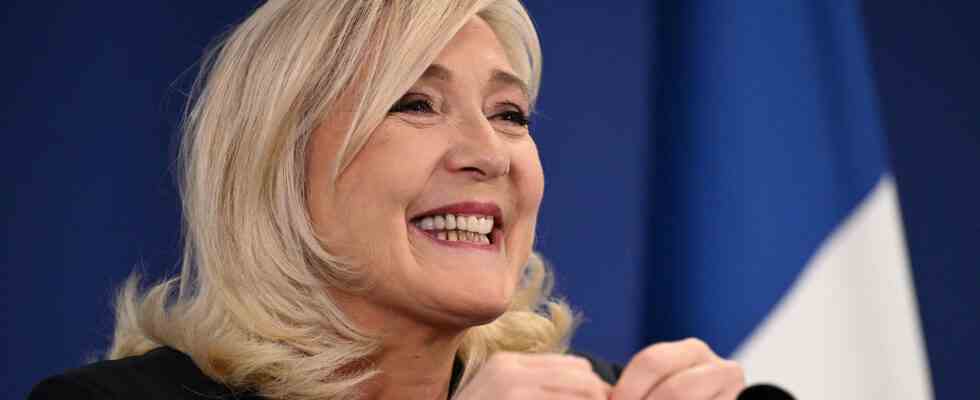Status: 04/23/2022 2:45 p.m
Before the French elections, there is great concern in Brussels about a right-wing extremist President Le Pen. It’s not just their proximity to Moscow that causes concern – observers also see the Union’s unity in danger in other respects.
You can’t really imagine that in Brussels yet. A far-right President of the French Republic at the table at the summit of heads of state and government. In the Europaviertel between Parliament, the Commission and the Council building, this is seen as an extreme endurance test for the Union: in a situation in which the war against Ukraine requires all diplomatic energies, in which the Union’s efforts are directed towards the one goal of demonstrating unity . In such a situation, Le Pen is the nightmare candidate for EU leaders.
Interference in national elections has been taboo in the EU. Chancellor Olaf Scholz and his counterparts from Spain and Portugal ignored this this week. In an unprecedented appeal in “Le Monde”, the three heads of government turned to the French: They now have the choice between a democratic candidate and a “candidate from the extreme right who openly shows solidarity with those who are attacking our freedom and democracy”. It is questionable what influence such a reference from abroad has on the voters. It rather shows the drama of the situation.
Stress test for the EU?
The European policy think tanks fear an extreme stress test for the Union. “Putin would definitely have an ally in the middle of Europe in Le Pen as president,” says Yann Wernert, policy fellow for Franco-German relations at the Jacques Delors Centre. Both have maintained close contacts for years, and Le Pen has repeatedly been received with great pomp in Moscow. “She always defended the Russian course, denied the military invasion of Crimea, and later approved the annexation.” Le Pen does not speak of Russian war of aggression, she says “la guerre russo-ukrainienne”, the Russo-Ukrainian war, that sounds more neutral.
For the time after the war, she calls for a “strategic rapprochement” between NATO and Russia, which is in the interests of France and Europe “and even in the interests of the USA”. At Allianz headquarters in Brussels, things are different. And takes note without comment when Le Pen announces at the same time that as president she will ensure that French troops are no longer placed under an integrated supreme command – neither under the command of NATO nor of the Europeans. France is not a middle power, she explains, but “a great power that still counts for something”.
What sounds like national fantasies and overconfidence is taken seriously in Brussels. France is a nuclear power and, after Brexit, the only EU country with a permanent seat on the UN Security Council. Le Pen’s closeness to Putin would give this French special position a new, dangerous dimension. Critics also see a financial dependency. The nine-million-euro loan from a Russian state bank, arranged by Putin, has to be paid off by 2028, political scientist Yann Wernert points out.
New alliances feared
If Marine Le Pen wins the elections, there is also a risk of new alliances within the EU. Central points of their election program are in contradiction to European law. The unequal treatment of citizens who are not French citizens, for example. In addition, a fundamental no to the primacy of European law over the national law of the member states. The governments of Poland and Hungary say the same thing – without the EU Commission in Brussels having been able to prevent it in years of legal disputes. “Le Pen would strengthen the camp of illiberal democrats,” predicts Wernert of the Jacques Delors Center. “Orban courts her and she courts Orban.” Here, too, the good relationship has already paid off financially. Le Pen received more than ten million euros in campaign aid from a Hungarian bank owned by billionaire Lörinc Mészáros – a childhood friend of Victor Orban.
So far, attacks on Europe’s legal system have come from Budapest, Warsaw and the capitals of some smaller Eastern European countries. Should Paris also get a government that is on a confrontational course against Brussels, that paralyzes the institutions and puts French law above European law, then that would be of a different quality. France is the second largest economy in the EU and France is a net contributor – meaning it pays more into the community budget than it gets back from there. It would be even more difficult for the European Commission to maintain its role as guardian of the European treaties against a French-led alliance of members who are shaking the pillars of the European legal system.
Macron at European level with successes
Quite a few in Brussels are wondering how EU opponent Le Pen could become a serious threat to staunch European Macron. With more chances than in 2017, when she was in the runoff. During his tenure, Macron was able to push through more of his own French goals in the EU than any of his predecessors. Joint debts to finance the Corona development fund – a success achieved after years of resistance by Chancellor Angela Merkel.
The green sustainability seal for nuclear energy, a stroke of genius that neither environmental organizations nor the operators of the nuclear reactors themselves had thought possible. And the filling of important key positions – from Ursula von der Leyen, who owes her office as Commission President to Macron’s moves, to Council President Charles Michel, the party friend, to the appointment of the ECB head with Frenchwoman Christine Lagarde. Therefore, according to an EU diplomat, the election on Sunday is not just a directional decision for France, but for the future of the European Union.
And if Le Pen wins? A nightmare for Brussels
4/23/2022 2:09 p.m

